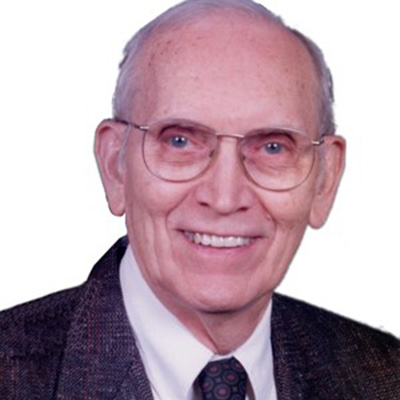In memoriam: John Hoover Hash
John Hoover Hash, who served for more than three decades on the Vanderbilt University Medical Center faculty and had been a member of the American Society for Biochemistry and Molecular Biology since 1965, died June 20 in Nashville. He was 94.

Born Feb. 23, 1929, in Franklin County, Va., the 11th of 12 children, Hash graduated as his high school valedictorian when he was 16. After earning a BS at Roanoke College and then teaching high school for two years, he was drafted into the Army. During the Korean War, he was stationed at Fort Detrick, Md., where biological weapons were being developed —a program he opposed.
Hash earned a Ph.D. in biochemistry from Virginia Tech in 1957 and held a postdoctoral fellowship at Columbia University. He worked at Lederle Labs in New York for six years before Vanderbilt hired him as an assistant professor in 1964.
At Lederle, Hash had discovered an unusual bacteriolytic enzyme produced by the fungus Chalaropsis. At Vanderbilt, he crystalized and and characterized the enzyme as a lysozyme that can kill bacteria by breaking through their tough membranes. He capped his research on antibiotics by editing a volume for the Methods in Enzymology series.
After Hash was appointed associate dean of biomedical science and director of sponsored research at Vanderbilt in 1976, he began helping colleagues secure research funding. He helped write computer programs to extract data from grant records and the VUMC Reporter dubbed him the “godfather of grants” when he retired as emeritus professor of microbiology and immunology in 1994.
Hash was elected a fellow of the American Association for the Advancement of Science in 1966. He was a member of the National Advisory Research Resources Council of the National Institutes of Health from 1991 to 1995.
In retirement, Hash focused on woodworking, pastel and oil painting, reading and travel. His art was eclectic; he painted whatever he liked, for the fun of it. He and his wife traveled to every continent except Antarctica.
He was preceded in death by his wife of more than 62 years, Mary Ann Hash. He survived by three children and their spouses, six grandchildren and two great-grandchildren.
Enjoy reading ASBMB Today?
Become a member to receive the print edition four times a year and the digital edition monthly.
Learn moreGet the latest from ASBMB Today
Enter your email address, and we’ll send you a weekly email with recent articles, interviews and more.
Latest in People
People highlights or most popular articles

2026 ASBMB election results
Meet the new Council members and Nominating Committee member.

Simcox wins SACNAS mentorship award
She was recognized for her sustained excellence in mentorship and was honored at SACNAS’ 2025 National Conference.

From humble beginnings to unlocking lysosomal secrets
Monther Abu–Remaileh will receive the ASBMB’s 2026 Walter A. Shaw Young Investigator Award in Lipid Research at the ASBMB Annual Meeting, March 7-10 in Washington, D.C.

Chemistry meets biology to thwart parasites
Margaret Phillips will receive the Alice and C. C. Wang Award in Molecular Parasitology at the ASBMB Annual Meeting, March 7-10 in Washington, D.C.

ASBMB announces 2026 JBC/Tabor awardees
The seven awardees are first authors of outstanding papers published in 2025 in the Journal of Biological Chemistry.

Decoding how bacteria flip host’s molecular switches
Kim Orth will receive the Earl and Thressa Stadtman Distinguished Scientists Award at the ASBMB Annual Meeting, March 7–10, just outside of Washington, D.C.
